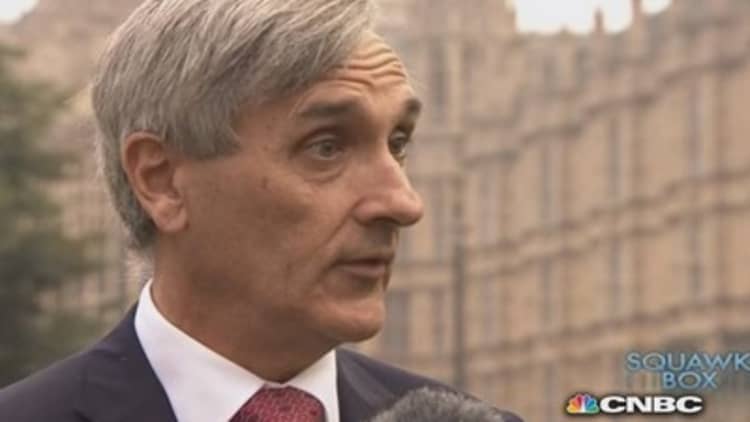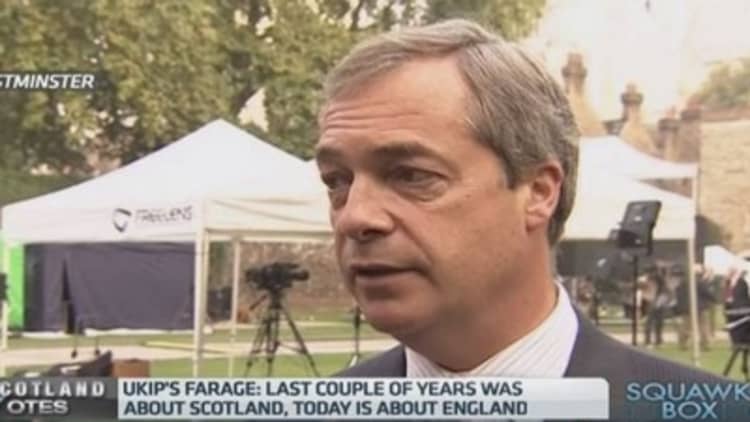
Policymakers in the U.K. have used the result of the Scottish referendum to back plans for more devolution for each part of the United Kingdom, thus raising the possibility of some hefty constitutional changes.
The three leaders of the main political parties at Westminster had agreed to give Scotland more powers even before voters decided to reject independence on Thursday. Prime Minister David Cameron reiterated this promise on Friday morning. He announced a new "balanced settlement" for Scotland which would involve draft legislation - to be ready by January - that could give the country more powers on tax, spending and welfare.
However, he also announced plans for further devolution for Northern Ireland and Wales in the next parliamentary term. He also outlined that England could expect to have more say on the laws that solely affect its citizens with English policymakers meeting separately in Westminster to debate domestic issues.
Read MoreMarkets stage relief rally on 'no' vote in Scotland
"Westminster is now expected to devolve more power to Scotland after a late promise by the leaders of the major Westminster parties," said Schroders European Economist Azad Zangana in a research note on Friday.
"Variability in tax rates may introduce distortions at a micro level, but should have little impact to the overall macro-economy."
Fitch Ratings said the fiscal risks posed by further Scottish devolution were low and that the the prospect of Scotland gaining more tax-raising powers did not have implications on the U.K.'s sovereign rating.
English devolution
John Redwood, a lawmaker from the Conservative Party, which currently holds the majority of seats in the U.K government, told CNBC on Friday morning that he was "delighted" at the result from Scotland and was looking forward to some "exciting changes" ahead.

"England wants self-governance too," he said, adding that the United Kingdom could become a "looser federation" if more devolution was voted through for each separate nation.
Read MoreScotland votes No: Scenes of joy and despair
With little information or public opinion on whether English citizens actually want more devolution it's hard to determine whether the population would actually vote for more autonomous control, however it appears policymakers are likely to push for the idea. This would essentially end a decades-long debate known as the "West Lothian question," where policymakers from Northern Ireland, Scotland and Wales can vote on matters that affect only England.
Nigel Farage, a lawmaker who currently sits in the European Parliament for the U.K. Independence Party but is eyeing a seat in the U.K. parliament, agrees with Redwood.
"(Today) it's about England," he told, CNBC on Friday morning. "England needs a proper fair voice."
Solving the "West Lothian question" could prove challenging, putting pressure on Cameron, warned George Buckley, chief U.K. economist at Deutsche Bank.
"If this is something that proves difficult to address (it has been debated since the late 1970s so a swift solution may be tricky to engineer) then the Prime Minister may be under threat from a back-bench revolt," he said in a note on Friday.
Can of worms?
The debate also brings to light the idea behind the "Barnett formula," which is a mechanism used by the U.K. government to adjust the amounts of public expenditure allocated to Northern Ireland, Scotland and Wales. Some politicians and campaigners in England have complained that this is unfair on the English with more being spent per person in Scotland than in England.
"Now that the Scottish vote is done, the English get their voice," Louis Cooper, a city analyst in London warned in a morning note.
"Nigel Farage is making political capital out of the English getting a raw deal. He is not going to go away. And sadly the degree of animosity of the campaign has not endeared Scotland to the rest of the U.K."
Cooper believes that this nationalistic "fervor" is likely to benefit anti-EU politicians like Farage and could lead to the U.K. exiting the Union. Cameron faces a backbencher revolt over the issue and a UKIP that enjoys some momentum.
"In a way we have replaced one political risk - Scottish independence - with another - EU referendum. And the latter is far more of an economic risk than the former," she added.
Other analysts disagree, highlighting that Scots are generally more in favor of the EU, whereas the majority of the U.K. is in favor of quitting.
"Continuation of the union means the risk of U.K. exit from the European Union has been reduced, although does remains significant," said Zangana.
Economic impact of referendum
In the short-term, the No vote is positive for the economy, avoiding the high degree of uncertainty a Yes vote would have generated.
"Overall, major disruption has been avoided and focus can now return to building on the strong economic recovery in progress. The Bank of England is now likely to press ahead with raising interest rates early next year in the absence of political uncertainty," said Zangana.
Read MoreScotland independence referendum—how they voted
The No vote will allow the property market to return to more normal trading conditions, said estate agency Knight Frank.
"We expect we will be very busy in the coming months as vendors and buyers, many of whom have put off making a decision to buy or sell a property in Scotland due to the referendum, return to the market," said Ran Morgan, head of Knight Frank Scotland, in a news release.
"The fundamentals are in place to ensure a full recovery, led by the key cities of Edinburgh, Aberdeen, Glasgow and rural counties within commuting distance of large employment hubs."
Long-term prospects for the overall economy are less certain.
"Long-term investors will be minded of the risk of separation and may demand a premium for undertaking fixed asset investments in Scotland going forward," said Zangana.
More independence bids to come?
The fact that Scotland was granted a referendum at all could encourage other independence movements. These include the Catalans in Spain who are vying for their own referendum in November.
"While a Scottish Yes vote may have boosted Catalan's pro-independence movement, the fact that a Scottish referendum was granted in the first place has drawn more attention to the Catalan issue," said Buckley.


